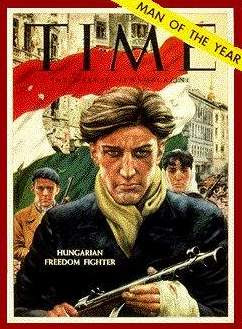 On October 23, 1956, students and workers gathered around the statue of General Bem in front of the Polish Embassy. The protestors boycotted work and demanded "A Socialist Hungary, truly independent; Imre Nagy reinstated in his former office; the State established on a new economic basis; new leaders for the Party and government; those responsible for mistakes held accountable at a public trial…" (Radio Budapest). Premier Hegedus could not control the revolt. At first, he sent the Secret Police, know as AVO, to stop the rebels. Tear gas was sent into the crowd and many of the students were taken into AVO's custody. When the crowd attempted to free the captive insurgents, the secret police opened fire on men, women, and children as well as the student protestors. The Hungarian Police arrived shortly after that and gave up their weapons to the protesters after hearing of the AVO shooting. The now armed students outnumbered the secret police. Finally, Hegedus called for Soviet assistance and declared Martial Law.
On October 23, 1956, students and workers gathered around the statue of General Bem in front of the Polish Embassy. The protestors boycotted work and demanded "A Socialist Hungary, truly independent; Imre Nagy reinstated in his former office; the State established on a new economic basis; new leaders for the Party and government; those responsible for mistakes held accountable at a public trial…" (Radio Budapest). Premier Hegedus could not control the revolt. At first, he sent the Secret Police, know as AVO, to stop the rebels. Tear gas was sent into the crowd and many of the students were taken into AVO's custody. When the crowd attempted to free the captive insurgents, the secret police opened fire on men, women, and children as well as the student protestors. The Hungarian Police arrived shortly after that and gave up their weapons to the protesters after hearing of the AVO shooting. The now armed students outnumbered the secret police. Finally, Hegedus called for Soviet assistance and declared Martial Law. At first, the Soviets seemed to accept the demands of the protesters and took their tanks out of Budapest. The USSR, although withdrawing their troops, did not go all the way back to the Soviet Union like they had promised. On November 3rd, reinforcements arrived on the border to Hungary.
On November 4th, 1956, the Soviet army returned, this time crushing the revolt. Imre Nagy announced the attack over the radio in his famous, and last speech to the Hungarian people: "Soviet troops attacked our capital with the obvious purpose to overthrow the legitimate Hungarian democratic government. Our troops are fighting. The government is in its place."
Although many saw the Hungarian Revolt as a loss, it was in truth a victory. The revolution had succeeded until the USSR returned to stomp out the fire of revolt on November 4th. In addition, the "Bloody" Revolt proved to the rest of the satellite countries of the USSR that there was another way to live: free of Communism.
No comments:
Post a Comment